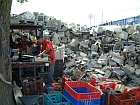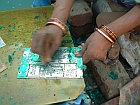R’07 World Congress from 3rd to 5th September 2007 in Davos
Winning back valuable material – and saving energy too

| A global perspective on the topic of recycling and energy efficiency is absolutely essential, maintains Lorenz Hilty, Head of Empa’s «Technology and Society» Laboratory in St. Gall and also head of the conference’s scientific committee. In order to make material life cycles sustainable we need to find intelligent technical solutions and then ensure that they are actually implemented by offering incentives and creating a favorable environment for this to happen. In the final analysis it is a question of maintaining as far a possible the value of materials over their entire life cycle, all the way from manufacture through usage to recycling.” Of particular importance in this context is the North-South dialog — that is, the cooperative activities with partners from threshold countries such as China, India and South Africa. Hilty’s team has already been successfully collaborating with partners from these countries for several years in projects to recycle electronic waste, financed by the Swiss State Secretariat for Economic Affairs (SECO). The SATW’s Annual Congress, which is also taking place under the auspices of the R’07 conference, is dedicated to this topic too, being entitled «Spreading Innovation between Asian Nations and Switzerland». «The R’07 conference program speaks for itself. It deals with extremely interesting and contemporary topics and offers a world-class list of speakers,» says Hilty with justifiable pride. | ||||
| The R’07 is the eighth event in a series of renowned international congresses which have been organized biennially since 1993, the last having been held in May 2005 in Peking (Beijing?). Empa has played a significant role in the organization since 1995. Innovation to provide more raw material and improve energy efficiency The R’07 congress is intended to be of interest to specialists from science and engineering, the manufacturing and recycling industry and representatives from national authorities and international organizations. | |||
| The aim of the conference is to provide a platform to introduce to participants innovative technologies which can be used to reduce raw-material consumption and improve energy efficiency in the manufacture, usage and recycling of products. Plenary lectures and workshops will cover controversial topics such as biofuels and biomaterials, electrical and electronic waste recycling, recovering rare metals (used for example in the electronic industry), «zero-waste» strategies, the recycling of building materials and plastics, environmental performance evaluation and life cycle analysis. Also included are the treatment of hazardous and toxic waste as well as new trends in waste separation and disposal. | ||||
| Empa Know-how for the «emerging economies» through global partnerships Empa researchers will also be using the opportunity presented by the R’07 congress to publicize the latest results of their work. David Rochat, for example, has been comparing the effects on human health and the environment of the uncontrolled «back-yard recycling» of electrical and electronic waste («e-waste») in Bangalore, India, with those of the industrial-scale recovery of metals in smelting works and refineries as is typically the case in Europe. | |||
| In India the recycling is carried out mostly by uneducated workers under the most primitive conditions with the gold, silver, palladium and other valuable metals often being recovered from the e-waste using highly toxic substances such as mercury or cyanide. Despite the danger, the recovery rate of the Indian workers’ recycling efforts is significantly lower than the industrial process, as Rochat’s investigation (performed as part of the Indo-German-Swiss e-Waste-Initiative) shows. Anahide Bondolfi uses a case study from South Africa to introduce the so-called «green e-waste channels», which already exist in several cities in China, India and, as already mentioned, South Africa, in the framework of the global E-waste Partnership initiated by SECO and Empa. In this process, attempts are made to ensure that every link of the recycling chain is maintained and performed in a way that is as ecologically positive and socially compatible as possible, beginning with the collection of the used equipment, via its repair, refurbishment and reuse, all the way through to its disassembly, separation and the recovery of valuable material. A comparison with experience gained in China and India is providing the first indications of how green e-waste channels function best in general terms and where problem areas may be expected. | ||||
| The problems involved with e-waste recycling are also the subject of a workshop being held by Empa scientists Mathias Schluep. According to Schluep, many of the international participants are pioneers in the setting up and implementing of e-waste management systems in their home countries. During the workshop the possibilities of establishing global e-waste partnerships will also be discussed. One such partnership, in which Empa is an active participant, is the StEP-Initiative («Solving the e-Waste Problem») launched in March 2007 under the leadership of the «United Nations University» (UNU) and other UN organizations. | |||
| Environmentally friendly fuels produced from waste Another workshop under the leadership of Empa scientist Rainer Zah is looking into the future of biofuels and biomaterials. One question participants will consider is «Under what conditions do biofuels make environmental sense?» In a recently published study conducted by Empa on behalf of the Swiss Federal Offices for Energy, the Environment and Agriculture, biofuels derived from waste materials gave the best results, primarily due to the fact that the necessary raw materials did not have to be manufactured first. But outstanding questions to be answered include how great is the actual potential of «waste-fuels» and how can they be most efficiently produced? | |||
| Christoph Knoeri has been investigating the recycling of waste building materials in different parts of Switzerland in another Empa study. It transpires that the acceptance of building material re-use is not equally high in all regions of the country – whilst in Canton Valais 87 per cent of all building waste is recycled, in Basel City this figure falls to just 67 per cent. The Empa researcher has used computer simulation to model how the attitudes of the leading players in the building process (such as architects and civil engineers) affect the recycling-related behavior of an entire region.
Specialist Information:
Editorial:
| ||||
| ||||
| ||||




